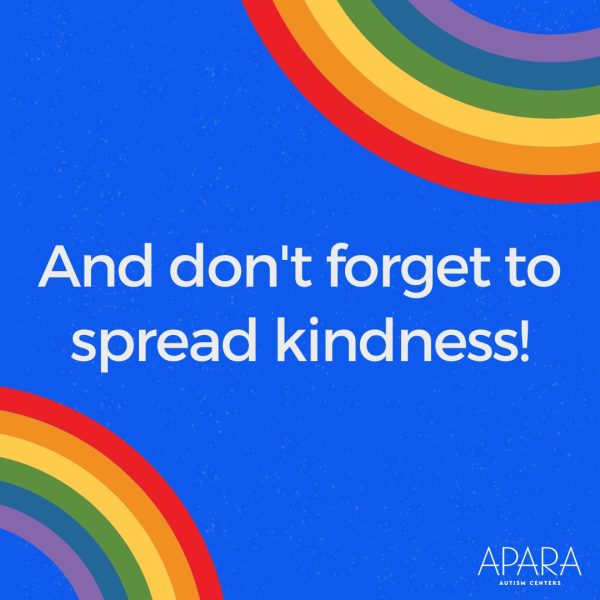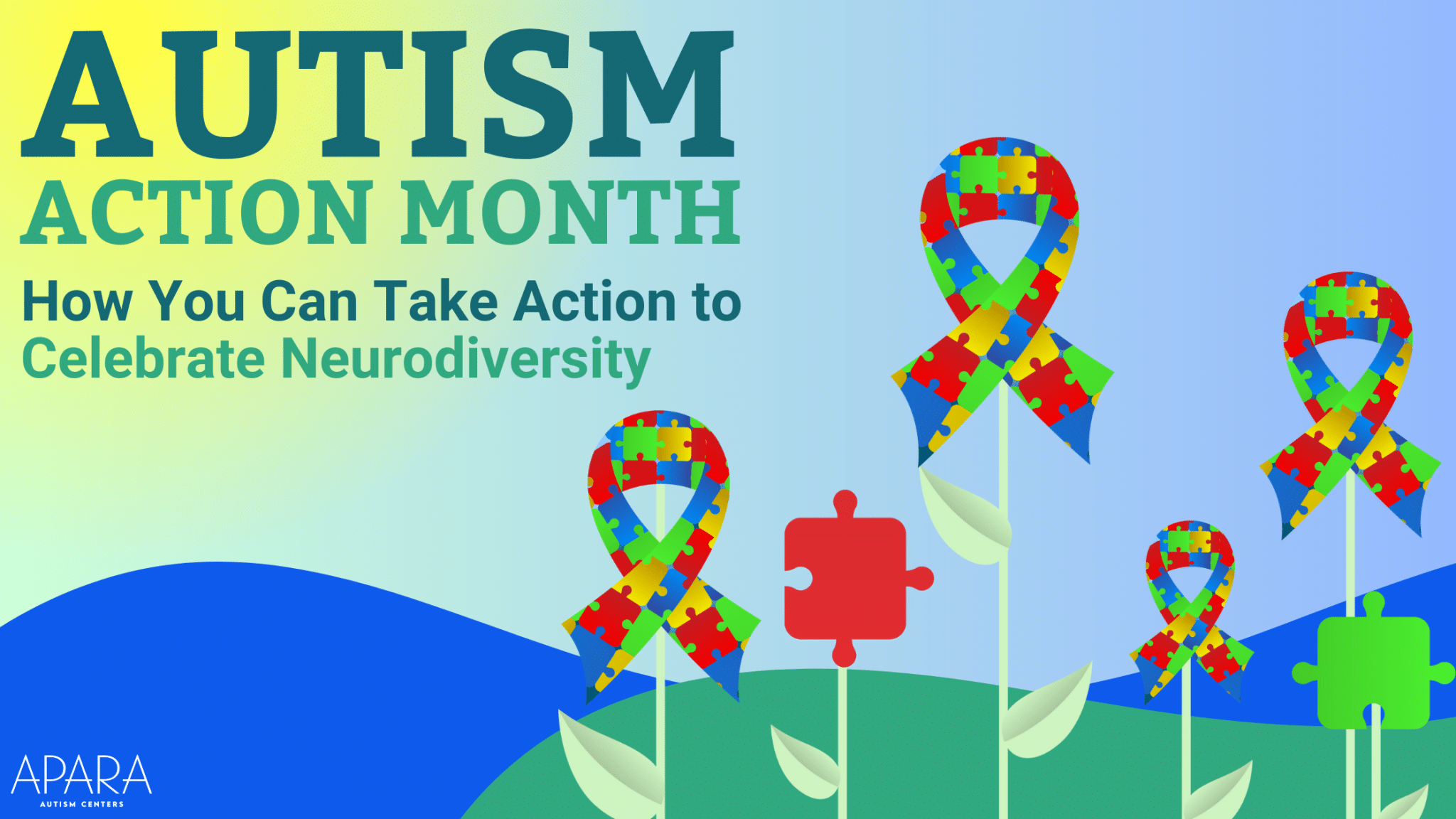If you have a connection to the autism community—or even if you don’t—you may have heard that April is Autism Awareness Month, also called World Autism Month. Throughout the month, the world focuses on unity and collaboration by fostering support, sharing stories, and connecting to create a more inclusive world. On March 23, 2023, the CDC updated statistics on the prevalence of autism to 1 in 36 American children that are affected, an 18% increase from previous years (the last update was 1 in 44). As the prevalence of autism continues to rise, it is crucial to raise awareness and understanding to ensure that individuals on the spectrum receive the resources and support they need.
This month, we’re shifting gears to Autism Action Month, promoting increased inclusivity for those with autism. By replacing ‘Awareness’ with ‘Action,’ we aim to empower and inspire people to support individuals on the spectrum actively. Join us in fostering kindness, education, advocacy, and awareness, as we collaborate to build a world that embraces inclusivity.
Keep reading to learn how you can take action this month.
Educate Yourself About Autism
Autism is considered a form of neurodiversity. Neurodiversity is a concept that acknowledges and respects the natural variation in human brain function and behavior. It emphasizes that neurological differences, like autism, are not inherently negative but rather a part of human diversity. Autism, as a neurodevelopmental condition, represents one of the many ways that human brains can be wired differently. Embracing neurodiversity encourages acceptance, understanding, and support for individuals with autism and other neurodevelopmental conditions.
Support Autism-Friendly Businesses and Employers
There are many businesses actively working to be inclusive of individuals with autism. We have several blogs about the businesses and events in the Dallas, Houston, and San Antonio areas that you can check out to find the perfect activity, event, or restaurant for your family.

Make An Inviting Safe Space At Your Place Of Business
Think about lighting and noise levels as these can easily overstimulate neurodivergent people. Lamps are a great way to control the light levels in a room, and can be turned on and off to adjust how bright the space is. Sensory boxes and toys are excellent tools that can make difficult days easier. These can include a variety of objects that can reduce anxiety, such as noise-cancelling headphones and fidgets.
Learn About The History Of Autism
We’ve come a long way in the last 100 years in better understanding and supporting autism and other forms of neurodiversity. Picture books and ebooks are excellent for teaching children about how neurodivergent and neurotypical brains work differently.
Here are some children’s books that emphasize messages about friendship, community, and understanding:
- “Ethan’s Story: My Life With Autism” by Ethan Rice
- “The Girl Who Thought in Pictures: The Story of Dr. Temple Grandin” by Julia Finley Mosca
- “Brotherly Feelings: Me, My Emotions, and My Brother with Asperger’s Syndrome” by Sam Frender and Robin Schiffmiller
- “Leah’s Voice” by Lori Demonia
- “Since We’re Friends: An Autism Picture Book” by Celeste Shally

Be An Autism Ally
You can be an Autism Ally in lots of different ways. Firstly, simply listening to and understanding the a person with Autism in your life. Understand their strengths, their challenges, their skills and their talents. The best way to learn is from the individual themselves. If your child is the only neurodivergent person in your life, it can sometimes be difficult to learn from them directly. This is where support groups, online forums, social media, and us can provide some insight into understanding your child.
Provide Alternatives For Participating Or Interacting
One size doesn’t fit all, so build in alternatives and options that allow individuals to choose what works best for them: for example, “stand or sit,” “unmute or chat,” “raise your hand or say ’yes’.”
Check Out the Work of Famous People with Autism
Some of your favorite celebrities and creators are on the autism spectrum. Here are five famous figures with Autism- are you familiar with their work?
- Greta Thunberg: Swedish teenage environmental activist.
- Satoshi Tajiri: Creator of “Pokémon” and video game designer.
- Daryl Hannah: American actress best known for her roles in Steel Magnolias, Wall Street, The Little Rascals, Kill Bill, and more.
- Alexis Wineman: Autism advocate, Miss America pageant contestant, and “Miss Montana.”
- Dan Aykroyd: Canadian actor, comedian, writer, producer, and musician best known being part of The Blues Brothers and Ghostbusters.
Spread Awareness in Your Community
Be an Autism Advocate and spread awareness in your own community. Learning more about neurodiversity, showing your support, raising awareness, donating to charities and organizations that support individuals with Autism, or participating in fundraisers are all simple ways to get involved and spread awareness in your own community. Reach out to family, friends, coworkers, and neighbors to get involved, too.
Spread Kindness
Make the world a more inclusive place and spread positivity. Any act of kindness, big or small, can make an impact and is a powerful way to show others you care. A family member, friend, or person in your community will feel appreciated, loved, valued, and important. Give someone a call to say “hi,” write a friendly letter, or give a stranger a compliment. Kindness is contagious, and may inspire others to do the same. In the spirit of inclusion, reach out and show kindness to those around you.

About the Authors
Apara Autism Centers is a leading provider of ABA therapy in Texas to children ages 18 months and up. We understand the difficulty of dealing with uncertainty and are prepared to assist you with our collaborative developmental therapy support. If you’re looking for ABA therapy near you, we have centers in Houston, Dallas, San Antonio, and surrounding areas. Apara Autism Centers employs a team of Board Certified Behavior Analysts (BCBAs) and Registered Behavior Technicians (RBT) that can assist you with resources to help comfort your child during stressful times. We include parent training as collaborative support for the whole family. If you need more information, don’t hesitate to call (844) 272-7223 or contact us at info@aparaautism.com with your questions or to enroll. We accept most insurance plans and offer full and part time programs as well as in-home therapy options with no waitlist.





